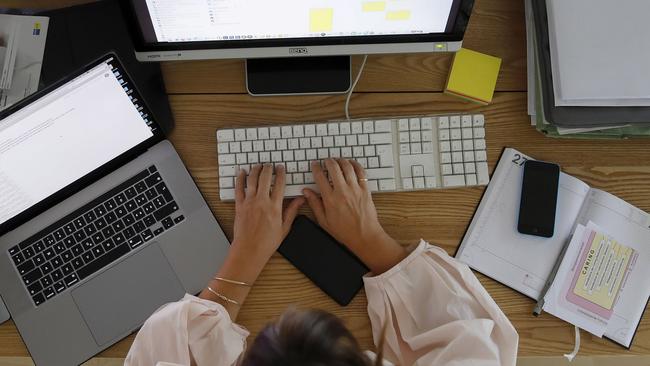Are people now happy to head back into the office?
It’s early days, but are people happy enough to head back into the office after the best part of a year at home?

So is the brave experiment all over bar the shouting? Are we all to be back at work after the January holidays? And are you secretly relieved that your 2019 work arrangements will be restored in 2021, that the “new normal” will in fact morph back into the old normal of commutes and office birthdays and face-to-face conversation with your boss?
It’s early days, but a report from my colleague Ewin Hannan this week suggests that working from home is on the wane. People, it seems, may be happy enough to head back into work after the best part of a year at home.
I’ve been an enthusiast for WFH in recent months. After decades of going to the office every day, I ought to have been well and truly institutionalised. Yet I pivoted easily to working from the front room, happily working longer hours and (apologies to colleagues) not feeling at all lonely. Living alone was a plus, not a problem, and my built-up, busy inner-city street made the whole experiment liberating and productive.
I wrote stories about Australians discovering how nice it was to stay home to work. For months, the word from consultants, corporates, developers, workers was that COVID-19 had disrupted work as we knew it. At the least, employers would be forced to introduce — some of them willingly — a hybrid model with people back in the office a couple of days a week, if they were lucky.
But here’s the thing. The past two or three weeks, under instructions from my manager, I have spent time back in the office and have readjusted so well that I’ve been coming in every day. Not all my work is easier in the office, but enough of it is to make it attractive. And it’s been fun to reclaim the dining room table and to dust down some of the work clobber.
So why has it been so easy? There are several reasons and they can be applied to other knowledge workers as either encouraging or discouraging a return to the office.
The choice
Most of us accept that once we cross the foyer at work we have very little choice about how we dress or behave or even how we set about our job. Some workers have more autonomy than others — in the sense that they are not directly supervised and can decide how they approach a project. But many do not. Having a choice about working from home or not — which is what confronts many employees now — makes it easier to go back to the office. You, rather than the boss, can have a change of mind. It’s truly disruptive to the power balances that have dictated work patterns since the Industrial Revolution. Ironically, just the awareness of choice may mean that people will be happy to choose the institution.
The commute
I walk to and from work and lose very little time if I go to the office. This is very unusual and for most people, calculating the time and the health risks of the commute will be crucial in deciding whether to go back to the office. It’s likely that in the next few years, researchers will predict with precision which employees will opt for remote work based purely on the kilometres between their home and headquarters.
The children
I have none, so escaping them by returning to the office was not an issue. But companies planning their floor space will have to factor in the demographics of their workforce. Is a 40-something with two teenage children more or less likely to favour his own desk in the CBD? Will single, childless persons be happier at home or are they in the age group where the CBD is the place for meeting potential partners? If you have a high number of women in their 20s and 30s, will you be able to clear a floor or two of the high-rise while they get through the child-rearing years?
The computer
Remote access is fine, the Wi-Fi works, and laptops and monitors and iPads and smart phones make WFH, indeed WFA (working from anywhere) easy enough. But, wait there: working from the office is easier still. The take-up of technology during the pandemic has been economically and socially phenomenal. For some industries (my own included) it has transformed operations as we realised tasks we once considered impossible remotely are easily done from home or cafe. But every now and then the whole thing collapses and the only answer is to head to the office. Next year will workers pivot and make home the default setting as they embrace the office systems?
The cold
The power bills surged over winter. Sydney is warmer than Canberra, Hobart and Melbourne where staying home on a rainy day may be welcome but where the joys of the CBD’s central heating will help people leave home — not just for comfort but also cost. Companies that want staff to stay home may have to announce an expenses policy around gas and electricity.
Researchers have identified many other reasons why people will return to work — from the lure of free food to fear that they will miss out on a promotion if they never eyeball the boss. But working out who will choose the office — and what levers to pull — will keep the consultants in business for a while longer.



